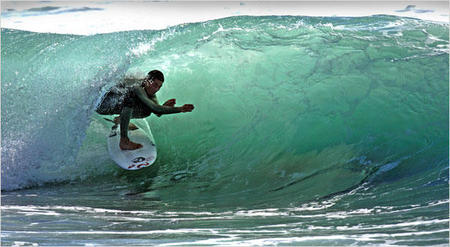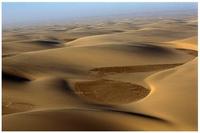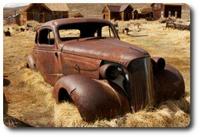| Freedom and Complexity | 2008-07-11 01:43 16 comments |
 by Flemming Funch by Flemming FunchWhat is freedom? There are many definitions, like here from dictionary.com:
There are other definitions of freedom, like, in science one talks about degrees of freedom, in the sense of the number of parameters in some process, or the number of directions in which some mechanical element can move. That's a different thing, but still related. Interestingly, none of these definitions talk directly about what you get out of it, what that buys you, and how useful and valuable that is. Yes, these kinds of freedom is something good and valuable in itself. Some of them are positioned as human rights or privileges, something that people would want to have if they don't have it, and which might be an end in itself. But there's kind of more to it. There's an important ingredient in freedoms that we will experience as valuable. If you can sit in prison and think anything you want, is that freedom? If you can say anything you want, but you can't do anything about it, is that freedom? Here are some other definitions of freedom that I made up:
 Let's take an example. Let's say I'm in the position to give you 10 square miles of property in the Sahara. Including some millions of tons of sand. It is yours to keep. You can do whatever you want with it, nobody's going to bother you, you've got totally free hands. You can say or do anything you want there. Total freedom. No? You don't want it? Let's take an example. Let's say I'm in the position to give you 10 square miles of property in the Sahara. Including some millions of tons of sand. It is yours to keep. You can do whatever you want with it, nobody's going to bother you, you've got totally free hands. You can say or do anything you want there. Total freedom. No? You don't want it?
The thing is that you probably wouldn't know what to do with it. Or, rather, it would be a whole lot of trouble and require a lot of additional resources to do anything useful with it. Even though it is free, and you're free to do what you want. In reality you can't do much with it.   OK, how about this car on the left? Take it home, here's the pink slip, do with it what you want, total creative freedom. OK, how about this car on the left? Take it home, here's the pink slip, do with it what you want, total creative freedom.
Or would you rather have the car on the right? It is tanked up, ready to go, it takes off vertically, flies 300 km/h, the keys are in the ignition, it has GPS, it handles like a charm. Chances are that the flying car there feels more like freedom to you than the wreck on the left. Even though, according to all the definitions of freedom at the top, you had the same amount of freedom. Not all freedom is worth having. The freedom you want is where you have the most options, and you get the most bang for your buck. This is where we get into complexity. Complexity in the sense of an intricate web of connections between stuff that together will do something potentially cool, useful and/or surprising. Now, that old clunker of a car up there. If you were well versed in the rich history of this car model, and you were mechanically gifted, and you had power tools, a network of parts suppliers, appreciative friends, a cozy garage, and a lot of time on your hands, that could be a great project. That could be freedom, but it requires this network of stuff connected to it for it to come to life. Those 10 square miles of Sahara desert, if you had engineers, bulldozers, a power plant, and a huge budget, you could build the city of your dreams. The usefulness of freedom depends on the complexity of the system around you. You don't want to have to do it ALL yourself. You want knowledge, tools, financing, friends, partners, etc. You want things to happen. When you push buttons, you want things to get into motion. We might forget to notice the richness of the complex world that exists around us. Most elements in our lives depend on a complex web of connections. You can only call somebody on your mobile phone because a lot of events have happened previously, clever people inventing and improving pieces of technology, connecting them together. You only have somebody to call because you have gone through the process of having friends, with which you have something in common. They again have other connections, other skills, other knowledge, etc. This whole complex web of people and stuff has evolved and self-organized. Not in a random way, but through a large number of meaningful individual actions. It is not the most perfectly organized and efficient system, but it is more or less the best thing that could have happened by itself. What you're in is a network, a system, where lots of work has gone into the way things are connected. Most of the pieces are already wound up, ready to go in one way or another. A system where, if you do something, it is likely to have an effect. Most of the time a small effect, but sometimes a big effect. Because everything is connected together, and if you manage to be in the right place at the right time, all the leverage in the world is potentially available to you. There's no perfect formula for knowing where that is, but the opportunity is there. My point is that useful freedom involves leverage, being able to do a lot with a little. To do that requires some kind of complex set of connections between people and resources. Large dynamic systems, like social networks, tend to self-organize into a critical state, the most efficient way it could have happened by itself, a state where there are lots of opportunities for making things happen. It is a bit of a mental leap to make freedom have something to do with complexity, but it makes sense to me. And of course it would be worthwhile to understand complexity a lot better. Particularly the type of complexity that might maximize freedom and value for the greatest number of people. |